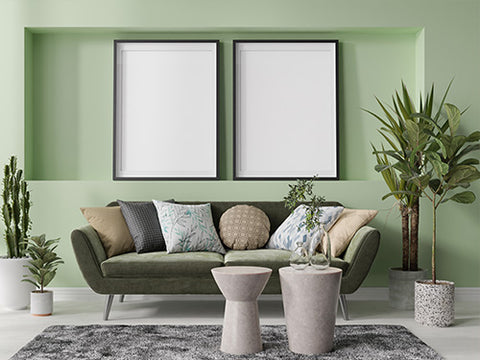Sustainable Choices to Make When Building Your New Home

The Importance of Eco-Friendly Building Materials
Selecting the right materials is the cornerstone of sustainable home building. Materials that are locally sourced, renewable, or recycled greatly reduce the environmental impact of your construction. For instance, bamboo is a fast-growing and durable material that is an excellent alternative to traditional hardwoods. Recycled steel, reclaimed wood, and low-VOC (Volatile Organic Compounds) paints are other examples of sustainable materials that minimize your ecological footprint.
What’s more, using materials like cork flooring or recycled glass tiles can add a unique aesthetic to your home while being environmentally responsible. It's important to research and choose suppliers who prioritize sustainability in their production methods. This ensures a lower carbon footprint for your materials and supports businesses committed to eco-friendly practices.
Insulation Matters
Good insulation is a game-changer for energy efficiency in any home. Choosing high-quality insulation materials can significantly reduce heating and cooling costs, leading to a smaller carbon footprint and lower utility bills. Options like cellulose, made from recycled paper, or sheep’s wool, a natural and renewable resource, are excellent choices for eco-conscious homeowners.
In addition to that, investing in advanced insulation technologies, such as spray foam or rigid foam boards, can provide superior thermal resistance and air sealing capabilities. These options keep your home warmer in the winter and cooler in the summer and contribute to a more consistent indoor temperature, enhancing overall comfort. Proper insulation also helps reduce noise, creating a more serene and peaceful living environment.
Energy Efficiency
Energy efficiency is important for sustainable building. Features like solar panels, energy-efficient windows, and LED lighting can drastically reduce your home's energy consumption.
Another smart yet frequently overlooked enhancement for your energy-efficient home is to choose solar street lights for outdoor lighting. These are both environmentally friendly and cost-effective, as they rely on solar energy, reducing your electricity bills. Solar street lights are an excellent addition to driveways, gardens, and paths, illuminating your outdoor spaces with renewable energy.
While an upfront investment, solar panels offer long-term savings and a clean, renewable power source. Energy-efficient windows also help maintain the temperature inside your home, reducing the need for excessive heating or cooling.
Smart Home Technology
Smart thermostats, energy monitors, and automated lighting systems allow you to control and optimize your home’s energy use, even when you're not physically present. Smart appliances such as refrigerators, washers, and dryers can also be programmed to operate during off-peak hours, saving energy and reducing costs.
Integrating smart irrigation systems in your garden ensures water is used sensibly, contributing to a sustainable lifestyle. These technologies make your home smarter and more efficient and provide unparalleled convenience and comfort, allowing you to manage your home environment with just a few taps on your smartphone.
Water Conservation Techniques
Water is a precious resource, and sustainable homes should prioritize its conservation. Installing low-flow fixtures in bathrooms and kitchens, rainwater harvesting systems, and drought-resistant landscaping are effective ways to reduce water usage. These measures not only conserve water but also lower your utility bills.
Likewise, using mulch in your garden can help retain soil moisture, reducing the need for frequent watering. Integrating a drip irrigation system, which delivers water directly to the plant roots, can be an efficient way to water your plants. By making these conscious choices, you're saving water and creating a more sustainable environment for future generations.
Greywater Systems
Consider installing a greywater system, which recycles water from showers, sinks, and washing machines for toilet flushing and garden irrigation. This is an excellent way to maximize water efficiency in your home. Greywater systems can significantly reduce the demand for freshwater, which is especially important in areas facing water scarcity.
You can maintain a lush garden without the guilt of excessive water consumption by reusing water. Moreover, these systems can be tailored to meet the needs of your household. They can be integrated seamlessly with other water-saving measures in your home, forming a comprehensive approach to water conservation.
Sustainable Home Design Principles
One of the sustainable choices to make when building your new home is designing with the environment in mind. This process is about more than just the materials and technologies you use. It’s about how the home is laid out and interacts with its surroundings. Passive solar design, for example, takes advantage of natural heating and lighting, reducing reliance on artificial sources. This involves strategic placement of windows and using materials that absorb and slowly release heat.
Similarly, incorporating green roofs or living walls can greatly improve insulation and air quality while adding aesthetic appeal. The orientation of the home is another important aspect; positioning your home to maximize natural light can significantly reduce lighting needs during the day. These thoughtful design choices contribute to sustainability and a harmonious living space that resonates with nature.
Landscaping and the Environment
The way you landscape and manage your outdoor spaces can also impact the sustainability of your home. Choosing native plants, creating spaces that support local wildlife, and using organic gardening practices all contribute to an eco-friendly home environment.
Native plants are particularly beneficial as they are adapted to the local climate and require less water and maintenance. Incorporating elements like a rain garden can also help manage stormwater runoff naturally.
Long-Term Cost Benefits
While some sustainable choices may have a higher initial cost, it's vital to consider the long-term savings. Energy-efficient appliances and systems reduce monthly utility bills. Durable, high-quality materials extend the lifespan of your home, lessening the need for frequent repairs or replacements.
Over time, these choices can result in significant financial savings. For example, installing a high-efficiency HVAC system or high-quality insulation may have a higher upfront cost, but the reduction in energy bills over time can be substantial. Investing in sustainability is not just environmentally responsible; it's also a financially smart decision in the long run.
Resale Value and Market Appeal
Homes built with sustainable practices often enjoy higher resale values and greater market appeal. As awareness and demand for eco-friendly homes increase, making sustainable choices when building your home becomes an investment in the future value of the property.
Buyers are increasingly looking for homes that are visually appealing, environmentally responsible, and cost-effective to maintain. Features like solar panels or a well-designed rainwater harvesting system can be significant selling points. Focusing on sustainability helps you create a better living environment for yourself but also enhances the marketability and appeal of your home in the future.
Embrace the Sustainable Choices to Make When Building Your New Home
The sustainable choices to make when building your new home are an empowering step toward a more eco-friendly lifestyle. From choosing the right materials and focusing on energy efficiency to embracing water conservation and smart design, each decision plays a role in creating a home that is comfortable, beautiful, and kind to our environment. As you plan your new home, keep these sustainable strategies in mind to ensure a healthier, more cost-effective, and environmentally conscious living space.

